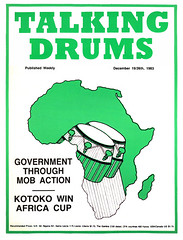Political economy of the "31st December Revolution" Continuity or change? (Part 2)
Akwasi Brown
In the concluding part of the article first published last week, Akwasi Brown argues socio-political changes that the PNDC have introduced necessarily imply the displacement and alienation of a section of the population a situation in which the government has to constantly justify why it thinks it is more capable to govern the country.On the political front, the PNDC policy hinges on the national democratic struggle. This strategy has two main objectives. First, it is aimed at strengthening and consolidating the power base of the less articulate segments of society in order to "ensure their genuine participation in the decision-making process.
Second, the strategy aims at mobilizing all national forces for economic reconstruction and self-reliance. This aspect of the national democratic struggle aims at the achievement of national consensus. It seeks to bring together the "patriotic elements" of society to tackle the socio-economic paralysis of the country.
The objectives underlined in the national democratic struggle are laudable. However, there are certain ambiguities in this strategy which make its application in the present Ghanaian context impracticable.
To ensure the participation of the masses in the political process, the PNDC introduced People's Defence Committees (PDCs), Workers Defence Committees (WDCs) and a number of other similar Committees. These organisations have been quite active. For instance, members of the PDCS and WDCS have been encouraged to participate in the distribution of essential commodities, to expose mismanagement and corruption, and more important, to check the activities of petty commodity traders. In concrete terms, however, these organizations are yet to wield real political power.
Although the masses are being mobilized into PDCs, WDCs, etc., there is no indication that these Committees are capable of influencing national policies. Thus, the PNDC still initiates and approves major policies without the consultation or participation of the masses. Political power still emanates from the top to the bottom of society. For instance, the political impotence and the lack of influence of the masses came to the fore when the 1983 PNDC budget was introduced. The budget was prepared in total secrecy without any consultation with or any input from the masses.
The mobilization of all national forces, especially the most articulate segments of society such as doctors, lecturers, managers, lawyers, students and so on, has been encouraged by the PNDC. For the PNDC, the achievement of national consensus will facilitate rapid socio-economic reconstruction. This strategy is not really innovative except that it is couched in radical rhetoric. The same strategy was presented to Ghana by the Acheampong administration in the form of the so-called Union government.
Now the real question however is whether this strategy can achieve its objective (i.e. a national consensus which will facilitate socio-economic reconstruction). This is unlikely since, ironically, by precipitating a coup, the PNDC has itself made it difficult to have a government that truely articulates the interests of all political groupings. This is because the 31st of December armed insurrection merely led to the dislocation of the governing class in power at the time (PNP government) and also the displacement of other classes (the opposition parties). These classes were not completely decimated. They are now re-organizing themselves in order to throw challenges to the PNDC.
The activities of the Association of Recognized Professional Bodies (ARPB), the Bar Association, the National Union of Ghana Students (NUGS), the Ghana Democratic Movement (GDM) to name a few, confirm the determination of displaced political forces to recapture the reins of power. These forces still consider themselves as having been unjustly overthrown by the PNDC.
As class struggles and challenges to the PNDC rule intensify, it will be difficult for the government to gain support from all segments of society. This implies that the PNDC would have to constantly justify why it thinks it is more capable than the alienated political forces to govern the country. In other words, the PNDC is yet to legitimize itself in power. It cannot do so by simply appealing to "patriotic elements" of society.
In my opinion, the national democratic struggle does not provide a viable political alternative for Ghana, because the assumptions underpinning the strategy are confused.
It is clear from the above discussion that the PNDC is yet to introduce policies that will radically transform the existing socio-economic and political institutions. What therefore does the "31st of December Revolution" represent for the future of the country and the people of Ghana? This is a vexed question. In my view, the "31st of December Revolution" reinforces the status quo. Frankly, it is politically and economically impossible to successfully transform literally a coup d'état such as the 31st of December insurrection into a broad based "revolutionary" government. Indeed, the assumptions that propelled the PNDC into power on the 31st of December, 1981 may have been wrong.
Whilst the ideological confusion lingers on the majority of Ghanaians continue to face socio-economic and political hardships. Clearly, there are no easy answers or quick solutions to the problems of underdevelopment that confront the country.
In fact it appears the PNDC may have understood that and this might explain why the government has been cautious and has refused to adopt policies that would have resulted in a complete restructuring of the existing socio-economic and political order
